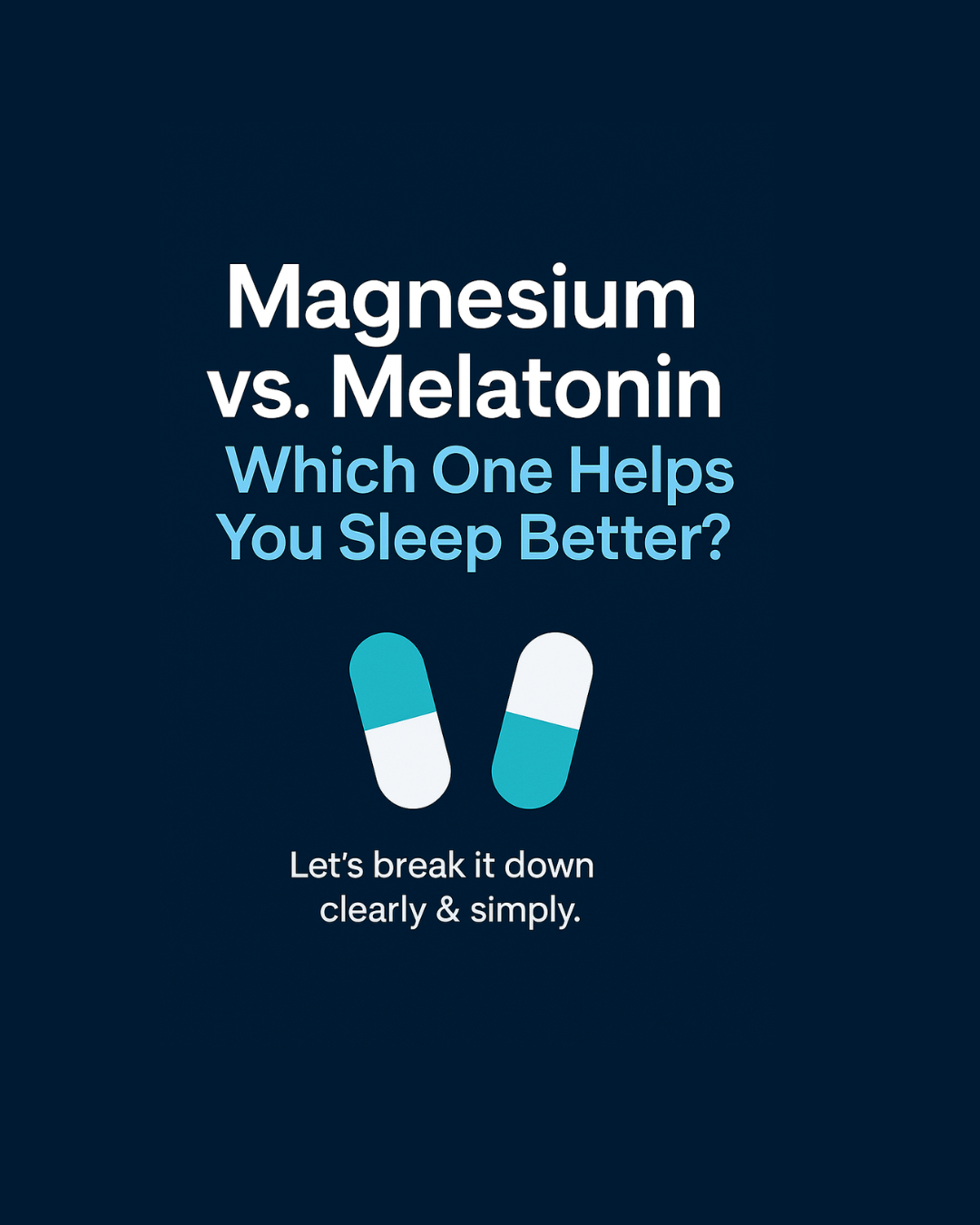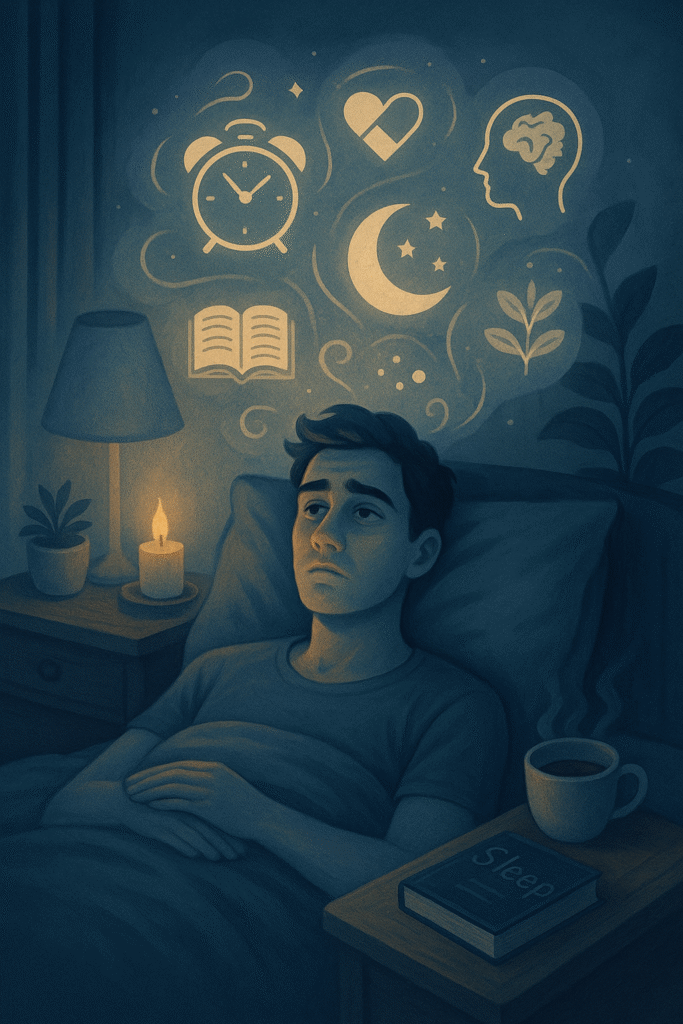Sleep supplements like magnesium and melatonin are two of the most popular choices for people struggling with poor sleep. But despite their shared goal, they work in very different ways:
- Melatonin is a hormone that initiates sleep.
- Magnesium is a mineral that supports relaxation and sleep maintenance.
In this article, you’ll discover how each one works, the pros and cons of each, and why magnesium may be the better long-term solution for deep, restorative sleep.
1. What Is Melatonin?
Melatonin is a hormone your brain naturally produces as darkness falls, signaling to your body that it’s time to wind down and sleep verywellhealth.com+1sleepcycle.com+1. It binds to your melatonin receptors—and is often used in supplement form to combat things like jet lag, shift-work fatigue, or short-term insomnia houstonmethodist.org.
Advantages
- Typically effective within 30–60 minutes health.com
- Helpful in resetting circadian rhythms
- Generally safe for short-term use
Drawbacks
- Can leave you groggy or drowsy the next day health.com+15en.wikipedia.org+15en.wikipedia.org+15time.com+10sleepfoundation.org+10health.com+10nhs.uk
- Side effects include vivid dreams, headaches, dizziness, and nausea
- Long-term safety is not well-established nhs.uk+6health.ucdavis.edu+6en.wikipedia.org+6
- Over- or mislabeled doses common due to poor regulation sleepcycle.com+15health.ucdavis.edu+15nypost.com+15
2. What Is Magnesium?
Magnesium is an essential mineral involved in more than 300 physiological processes, including regulating muscle and nerve function, hormone balance, and energy metabolism verywellhealth.com+1nypost.com+1.
When it comes to sleep, magnesium:
- Triggers calming neurotransmitters (like GABA) nypost.com+8sleepopolis.com+8sleepcycle.com+8.
- Enhances natural melatonin production, not just mimicking it sfchronicle.com+5health.com+5kosinmedj.org+5.
- Relaxes muscles and eases nighttime cramps .
- Reduces stress hormone cortisol, supporting deeper sleep health.com+1sfchronicle.com+1.
Benefits of Magnesium
- Helps you fall asleep and stay asleep
- Improves sleep quality, efficiency, and overall restfulness, especially in older adults health.ucdavis.edu+15pmc.ncbi.nlm.nih.gov+15thescottishsun.co.uk+15
- Supports other health outcomes: stress, anxiety, muscle recovery, and energy regulation
- Few side effects when taken properly—usually limited to mild digestive upset mayoclinic.org
3. Head-to-Head: Melatonin vs. Magnesium
| Feature | Melatonin | Magnesium |
| Type | Hormone | Mineral |
| Main function | Signals bedtime; resets circadian rhythm | Calms nerves & muscles; supports melatonin |
| Time to work | ~30–60 minutes | May take a few days to weeks to build effects |
| Suitable use cases | Jet lag, shift work, delayed sleep onset | Daily support for chronic sleep issues |
| Side effects | Grogginess, vivid dreams, nausea, dizziness en.wikipedia.orgen.wikipedia.org+2health.com+2health.com+2houstonmethodist.orgnhs.uk | Mild diarrhea or tummy upset |
| Long-term safety | Short-term use recommended | Safer, widely tolerated long-term |
| Impact on sleep maintenance | Primarily helps you fall asleep | Helps you stay asleep too |
4. What Research Says
Melatonin
- Meta-analyses confirm benefits for sleep onset (average 14–21 minutes faster) sleepcycle.com.
- Useful short-term, but long-term effects remain uncertain .
- Possible increased risks for daytime sedation, hormone disruption in some populations .
Magnesium
- A 2012 RCT in elderly subjects showed marked improvements in sleep efficiency, onset, duration, and reduction in cortisol pmc.ncbi.nlm.nih.gov.
- Observational data suggests magnesium enhances sleep quality by aiding GABA and melatonin verywellhealth.com.
- Sleep cycle data shows ~15 minutes extra sleep on average .
5. When to Use Which
- Use Melatonin when:
- You need help resetting your sleep schedule (e.g. after jet lag)
- You want immediate drowsiness support
- You need help resetting your sleep schedule (e.g. after jet lag)
- Use Magnesium when:
- You experience chronic sleep issues—like tossing, waking, or night cramps
- You’re also managing stress, anxiety, or muscle tension
- You want a natural, holistic, gentle long-term supplement
- You experience chronic sleep issues—like tossing, waking, or night cramps
6. Tips for Safe and Effective Use
✅ Melatonin
- Dosage: 0.5–5 mg, 30–60 min before bedtime verywellhealth.com+15houstonmethodist.org+15health.com+15verywellhealth.com+10health.com+10verywellhealth.com+10kosinmedj.org
- Duration: Use short-term only; avoid nightly use unless directed by a professional
- Side effects: Watch for drowsiness, vivid dreams, dizziness
- Quality check: Choose brands certified by USP or NSF health.com+1health.com+1
✅ Magnesium
- Forms: Glycinate (calming), citrate (digestive), threonate (cognitive)
- Dosage: 200–400 mg nightly; adjust by form and tolerance
- Onset: Effects build over days to weeks
- Side effects: Mild digestive issues possible; rarely overdose risks
- Source check: Third-party tested for purity
7. Real-World Use: Combine or Choose
- Short-term use: Melatonin alone may help temporarily (jet lag, schedule shift).
- Long-term routine: Magnesium supports holistic sleep health.
- Combined approach: Some studies show melatonin + magnesium + zinc combo improved elderly sleep efficiency and quality .
8. Lifestyle Tips for Better Sleep
Both supplements work best when paired with healthy habits:
- Maintain a consistent sleep schedule
- Avoid screens 60+ minutes before bed
- Limit caffeine and alcohol in the evening
- Keep your bedroom cool, dark, and quiet
- Relax with routines—reading, stretching, meditation
Conclusion
If you’re struggling to sleep deeply, magnesium may be your best long-term ally—helping with both falling asleep and staying asleep through natural relaxation. Melatonin can help short-term, but it’s not meant as a nightly fix.
For the most effective approach:
- Start with magnesium glycinate (200–400 mg nightly for a few weeks).
- Use melatonin occasionally—for jet lag or circadian disruptions.
- Pair both with consistent sleep hygiene and trustworthy supplement brands.
Sleep transformation isn’t about a quick fix—it’s about building sustainable habits and supporting your body’s deeper needs.
References
- Melatonin’s pharmacology and biological role ritual.comnypost.comen.wikipedia.org
- Melatonin + Magnesium + Zinc improved sleep in elderly
- RCT: Magnesium improved sleep metrics in older adults
- Side effects & regulation issues with melatonin supplements health.ucdavis.edu
“Want to learn more about Ways toimprove your sleep Tonight ? Read our article on Sleep Better: The 7 Powerful Ways Magnesium Works Its Magic



Pingback: 5 Common Sleep Myths Debunked: Your Guide to Better Rest - Vitallity Health Hub